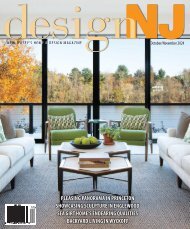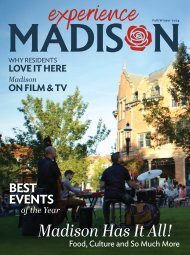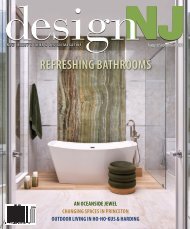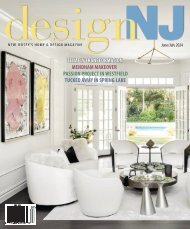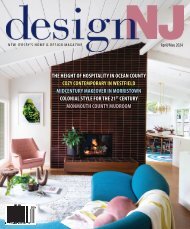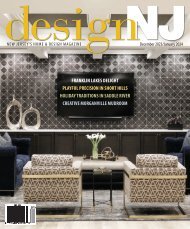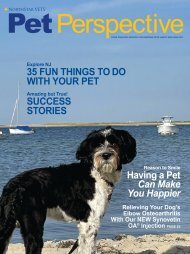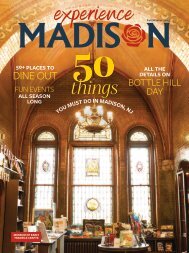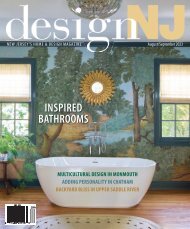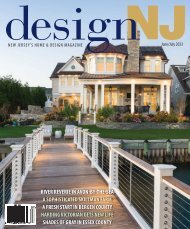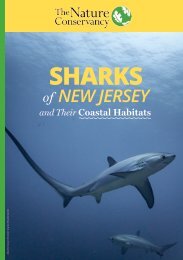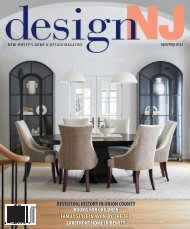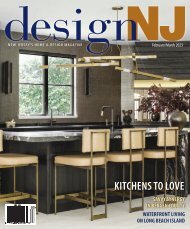Create successful ePaper yourself
Turn your PDF publications into a flip-book with our unique Google optimized e-Paper software.
C O V I D C H R O N I C L E S
TEANECK //
Improvising a New ICU
A tsunami of Covid-19 patients slammed Holy Name Medical Center in
March. Beds were in short supply; isolation pods were needed.
Steven L. Mosser, vice president for facilities, met with workers on a
Sunday to lay out the challenge. They had to move fast; there was no time
to wait for construction materials to be delivered.
“It was like a scene from Apollo 13,” says Mosser, who told his crew, “If
it’s not available today, we can’t use it.” The team fanned out to multiple
Home Depot and Lowe’s stores to grab supplies.
Within a month, 30 facilities employees and 50 contractors, plus volunteers
from around the building, transformed the hospital. They increased
the number of intensive care beds from 19 to 121. The number of beds in
negative-pressure rooms, where contaminated air is vented outside, was
upped from 12 to 276. They used plexiglass, duct tape and PVC pipe to
fashion more than 200 makeshift iso-pods, which surround patients to
limit the spread of contagion. Holy Name is seeking a patent for its iso-pod
design, but in the meantime, sharing it with other hospitals on YouTube.
Normally, creating a new intensive care unit would take nine months of
planning, permitting and bids. Holy Name built two in a matter of weeks.
Unlike his medical colleagues, Mosser, a mechanical engineer by training,
doesn’t usually get to save lives, but he feels that his Covid-19 efforts
probably did just that.
“That’s probably the most rewarding thing you can do,’’ he says.—KL
VERONA //
Masks for Veterans—
and More
Brett D’Alessandro, a former U.S. Marine sergeant,
and his girlfriend, Alexa Modero, have been
operating the Verona-based nonprofit Backpacks
for Life since 2014. The company distributes its
signature, American-made product, the Bowery
Pack, to homeless veterans. The backpack
includes a locking cable and collapsible sleep pad
and is stuffed with a rain poncho, blanket, toiletries
and emergency supplies.
But when Covid-19 hit, D’Alessandro and
Modero did an about-face. They began making
masks. “We developed great contacts in the U.S.
textile industry through the manufacturing of
our backpacks, and we knew we had the ability
to help,” says D’Alessandro. “It was a two-week
process of learning the materials and how to make
effective masks at the lowest cost possible, and
then we were on our way.”
The masks, which were fast-tracked for FDA
approval, are manufactured at United States
Manufacturing Company (USMC) in Passaic, a
cut-and-sew factory owned by Mario and Domenick
Monaco, who are also former Marines.
The masks consist of three layers of nonwoven
polypropylene that is water repellent and
breathable and has a bacteria filtration efficacy
of 95 percent.
D’Alessandro raised $45,000 through grants
and a GoFundMe campaign in April and produced
and distributed 7,234 masks to veteran’s associations,
VA hospitals, homeless shelters, soup
kitchens, police and fire departments, and small
municipalities. They are continuing to raise money
to achieve their goal of giving out 150,000 masks.
“We make no profit whatsoever,” says
D’Alessandro. “We just want to get the masks into
the hands of groups who have a need and can’t
otherwise afford them.”—Lindsay Berra
Call them signs
of the times.
Handmade
signs sprouted
on lawns and
in windows all
over the Garden
State, sharing
messages
of hope and
support amid
the fear and
suffering of the
pandemic. ✤
PHOTOGRAPHS: (HOLY NAME) COURTESY OF JEFF RHODE/HOLY NAME MEDICAL CENTER;
(SIGNS) ALL IRA BLACK EXCEPT HELLO FRIENDS, LAURA BAER
58 JUNE 2020 NJMONTHLY.COM



